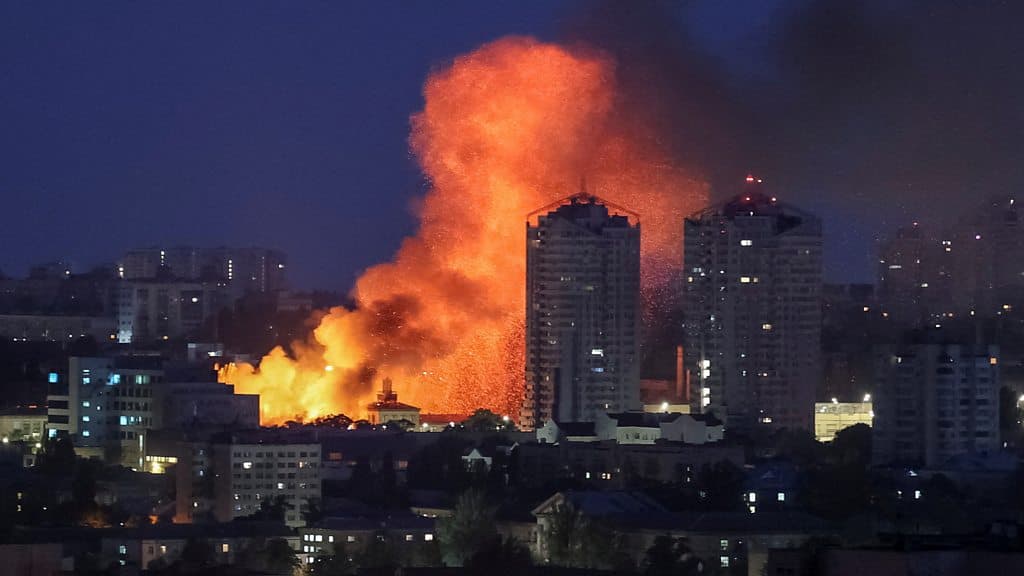We're loading the full news article for you. This includes the article content, images, author information, and related articles.
Overnight attacks strike Kyiv and Dnipropetrovsk, occurring shortly after President Zelenskyy’s renewed appeal for long-range missiles and expanded sanctions on Russian oil.

Russian forces launched a large-scale missile and drone assault across Ukraine overnight into Saturday, 25th October 2025, killing at least four people and wounding more than a dozen, according to Ukrainian officials. The attacks, which targeted the capital city of Kyiv and the Dnipropetrovsk region, came a day after Ukrainian President Volodymyr Zelenskyy appealed to the United States and European allies for more advanced weaponry and stricter economic sanctions against Moscow.
In Kyiv, a ballistic missile attack in the early hours of Saturday killed two people and injured at least twelve others, according to statements from Mayor Vitali Klitschko and Timur Tkachenko, head of the city's military administration. Emergency services responded to fires in non-residential buildings, including a warehouse, and damage to nearby structures from falling debris in the Desnianskyi and Darnytskyi districts.
In the eastern Dnipropetrovsk region, two people were killed and seven were wounded, acting regional governor Vladyslav Haivanenko reported. One of the deceased was a rescue worker killed in a repeated strike while responding to the initial attack, according to Ukraine's internal affairs ministry. The strikes in the region damaged apartment buildings, private homes, and commercial properties.
The Ukrainian Air Force stated that Russia launched a total of nine Iskander-M ballistic missiles and 62 attack drones, including Shahed and Gerbera types. Air defence systems successfully intercepted four of the missiles and 50 of the drones over various regions, the Air Force command reported on Saturday morning. Concurrently, Russia's Ministry of Defence claimed its forces had shot down 121 Ukrainian drones over its own territory overnight.
The aerial barrage followed President Zelenskyy's recent diplomatic efforts in London, where he met with European leaders. On Friday, 24th October 2025, he urged the United States to provide long-range missiles, such as Tomahawks, and to expand sanctions to cover Russia's entire oil sector, not just specific companies like Rosneft and Lukoil. These measures are intended to cripple Moscow's ability to finance its war effort as the conflict approaches its fourth winter. Russia has recently intensified its attacks on Ukraine's energy infrastructure, leading to widespread power rationing ahead of the cold season.
While the direct theatre of war is in Eastern Europe, the economic repercussions continue to affect Kenya and the broader East African region. The conflict has caused significant disruptions to global supply chains for grains, fuel, and fertilisers, contributing to inflation and a higher cost of living. In an August 2025 statement, Kenyan President William Ruto highlighted the war's severe impact on these supply chains, which are critical for the nation's food security and economy. A March 2025 report noted that while inflation has stabilised in much of East Africa, prices for essential commodities remain high, and public finances are strained due to increased borrowing costs exacerbated by the conflict.
Kenya's official stance on the conflict has evolved. After initially condemning the invasion forcefully at the United Nations in 2022, the government has shifted to a more neutral, non-aligned position, advocating for a diplomatic solution. During a meeting with the outgoing Ukrainian Ambassador in August 2025, President Ruto reiterated Kenya's belief in the UN Charter, national sovereignty, and territorial integrity, stating that "dialogue, not war, is the path to peace." Despite the official neutrality, Kenya has maintained diplomatic and trade relations with Ukraine, which have existed since 1993, and has supported Ukrainian initiatives at the UN. The war continues to pose complex challenges, impacting global stability and economies far from the front lines.
Keep the conversation in one place—threads here stay linked to the story and in the forums.
Sign in to start a discussion
Start a conversation about this story and keep it linked here.
Other hot threads
E-sports and Gaming Community in Kenya
Active 9 months ago
The Role of Technology in Modern Agriculture (AgriTech)
Active 9 months ago
Popular Recreational Activities Across Counties
Active 9 months ago
Investing in Youth Sports Development Programs
Active 9 months ago